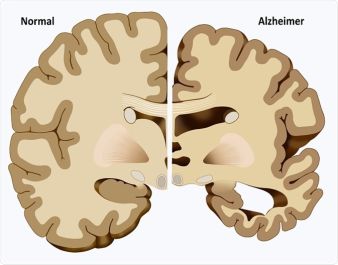Alzheimer’s Disease Treatment for patient with Severe Dementia which is dementia that causes issues with memory, thinking and behavior.
Dementia
The word ‘dementia’ describes a group of symptoms which will embody memory loss and difficulties with thinking, problem-solving or language.
Dementia is the name of a group of brain disorders that make it hard think clearly, to remember, make decisions, or even control your emotions. Alzheimer’s Disease is one of those disorders, but there are many different types and causes of dementia.

Causes and risk factors
Scientists believe that for most people, Alzheimer’s disease is caused by a combination of genetic, lifestyle and environmental factors that affect the brain over time.
Less than 5 percent of the time, Alzheimer’s is caused by specific genetic changes that virtually guarantee a person will develop the disease. Although the causes of Alzheimer’s aren’t yet fully understood, its effect on the brain is clear. Alzheimer’s disease damages and kills brain cells. A brain affected by Alzheimer’s disease has many fewer cells and many fewer connections among surviving cells than does a healthy brain.
Factors of Alzheimer’s disease
Age
Increasing age is the greatest known risk factor for Alzheimer’s. Alzheimer’s is not a part of normal aging, but your risk increases greatly after you reach age 65. The rate of dementia doubles every decade after age 60.
Family history and genetics
Your risk of developing Alzheimer’s appears to be somewhat higher if a first-degree relative — your parent or sibling — has the disease. Scientists have identified rare changes (mutations) in three genes that virtually guarantee a person who inherits them will develop Alzheimer’s.
Down syndrome
Many people with Down syndrome develop Alzheimer’s disease. Signs and symptoms of Alzheimer’s tend to appear 10 to 20 years earlier in people with Down syndrome than they do for the general population.
Gender
Women seem to be more likely than are men to develop Alzheimer’s disease, in part because they live longer.
Past head trauma
People who’ve had a severe head trauma seem to have a greater risk of Alzheimer’s disease.
Lifestyle and heart health
There’s no lifestyle factor that’s been definitively shown to reduce your risk of Alzheimer’s disease. Examples include:
- Lack of exercise
- Obesity
- High blood pressure
- High blood cholesterol
- Poorly controlled type 2 diabetes
- A diet lacking in fruits and vegetables
Alzheimer’s Disease Symptom
In Alzheimer’s Disease, the brain cells degenerate and die, inflicting a gradual decline in memory and mental function. Other than that, Alzheimer’s is a progressive disease. This means that delicately, over time, a lot of components of the brain are broken. As this happens, a lot of symptoms develop. They additionally become more severe.
- Memory loss
- Lose items around the house
- Forget about recent talks or events
- Forget appointments or anniversary
- Planning and performing familiar tasks
- Difficulty remembering newly learned information
- Get lost in a familiar place or on an ordinary journey
- Orientation – becoming confused or losing track of the day or date
- Struggle to find the right word in a conversation or forgetting someone’s name
- Difficulties making decisions, solving problems or carrying out a sequence of tasks

Once-routine activities that need consecutive steps, like planning and cooking a meal or taking part in a favourite game, become a struggle because the disease progresses. At first, increasing forgetfulness may be the only symptoms of the disease that you notice. But over time, the disease robs you of more of recent memories. Eventually, individuals with advanced Alzheimer’s Disease might forget the way to perform basic tasks like dressing and bathing.
Changes in personality and behaviour in Alzheimer’s Disease
- Apathy
- Delusions
- Depression
- Wandering
- Mood swings
- Distrust in others
- Social withdrawal
- Loss of inhibitions
- Changes in sleeping habits
- Irritability and aggressiveness
Alzheimer’s Disease Treatment
There is currently no cure for Alzheimer’s disease, but there are medicines available on prescription that can help delay the condition’s progression in some people.
Non-drug therapies such as physical activity, social contact and stress management, may also be of help. Treatment for Alzheimer’s disease may also involve planning for your care. This identifies the type of assistance that you might need and focuses on ways of providing this support.
Creating a safe and supportive environment
Adapting the living situation to the needs of a person with Alzheimer’s is an important part of any treatment plan. For someone with Alzheimer’s, establishing and strengthening routine habits and minimizing memory-demanding tasks can make life much easier.
Exercise
Regular exercise is an important part of everybody’s wellness plan — and those with Alzheimer’s are no exception. Activities such as a daily walk can help improve mood and maintain the health of joints, muscles and the heart.
Exercise can also promote restful sleep and prevent constipation. Make sure that the person with Alzheimer’s carries identification or wears a medical alert bracelet if she or he walks unaccompanied.
Nutrition
People with Alzheimer’s may forget to eat, lose interest in preparing meals or not eat a healthy combination of foods. They may also forget to drink enough, leading to dehydration and constipation.q
Prevention of Alzheimer’s disease
Right now, there’s no proven way to prevent Alzheimer’s disease. Research into prevention strategies is ongoing. The strongest evidence so far suggests that you may be able to lower your risk of Alzheimer’s disease by reducing your risk of heart disease.
Many of the same factors that increase your risk of heart disease can also increase your risk of Alzheimer’s disease and vascular dementia. Important factors that may be involved include high blood pressure, high blood cholesterol, excess weight and diabetes.
Get Insurance Advice
Financial Security – It is There When Needed
Levine can help you to protect yourself and the future of your loved ones. Get immediate financial security. Don’t touch your savings. Let insurance provide it.
She can help provide financial security in times of hardship and will be able to ease the financial burden of your dependents in your absence.
Contact our AIA INSURANCE AGENT LEVINE LEE to get in touch with us and start your personal coverage, group coverage or choose your plan now. Get covered correctly. Be advised correctly. Call Levine Lee (+6012-684 0948) today to be advised on the best insurance protection personalized for you. Or send us the form below on your interest.

At Red Cover Life Planning, we emphasize our people- helping them grow, expanding their abilities, and discovering new opportunities. Join us now to be part of our team and story.








